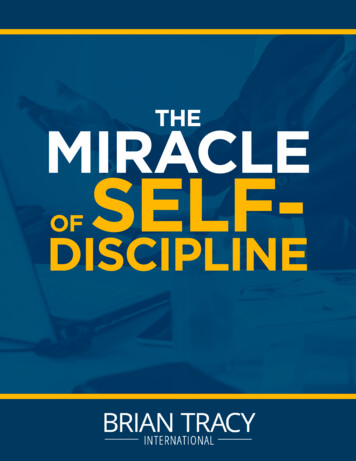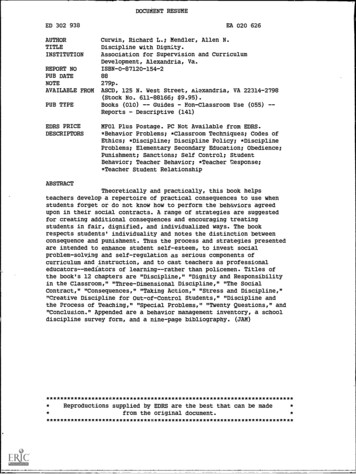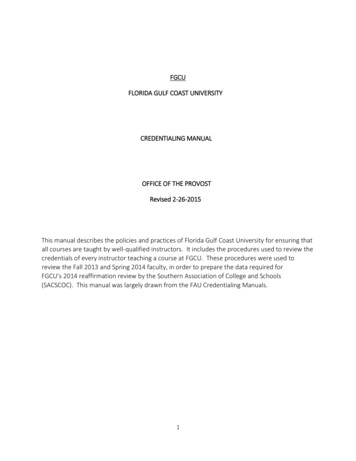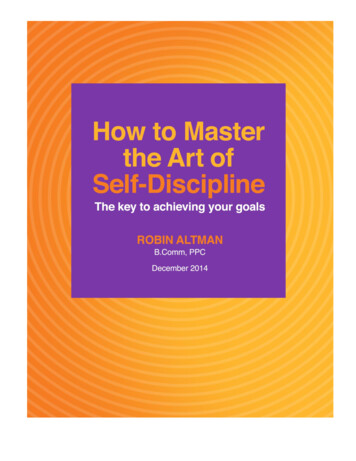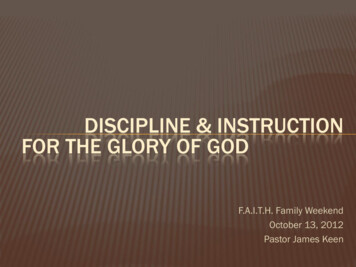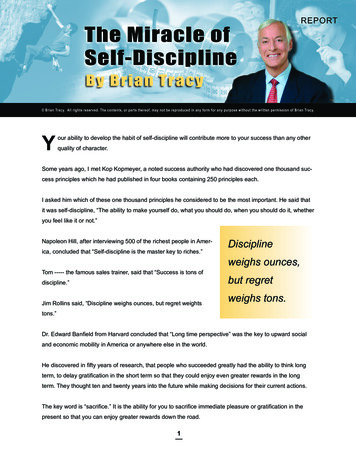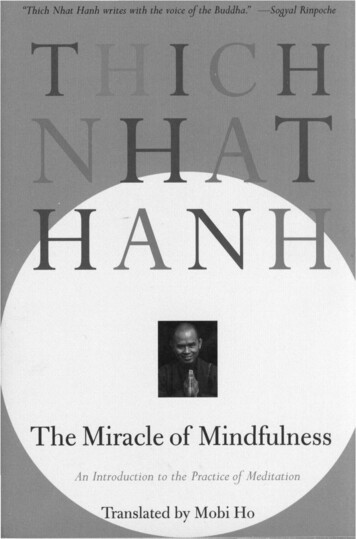
Transcription
W. R. Booker & Co.The Miracleof Discipline.Discipline can get you pips. 2003 W. R. Booker II. All rights reserved forever and worldwide.The information contained in this ebook is designed to teach you forex tradingstrategies so that you can make money. Alas, you’ll probably lose money. Weall do at first. Rob’s not liable if, based upon the information you read here, youlose money, make money, turn into a woodchuck, possum, or other furrycreature.
The Miracle of Discipline - pg 2PrologueHave you ever exited a trade at a loss, only to find that the trade wouldhave been profitable only a little while later? Have you ever exited a losingtrade, opened one in the opposite direction, and then lost twice?I have. I used to make those mistakes and many others.Have you ever not stayed in a trade long enough to get the full amount ofprofit from it?Discipline is the answer. Disciplined traders succeed and undisciplinedtraders fail. It’s really that easy.This isn’t an ebook about forex trading, though – at least not directly. It’sreally about how you can learn to acquire greater discipline in your life,which will make you a better trader (much better). In fact, I promise thatthis book will make you a better trader, as long as you’re willing to givesome of my advice a try. Once you’ve acquired greater discipline in yourlife, I’ve got a bunch of forex trading strategies that you can use (or youcan find many, many others elsewhere). But none of those strategies areworth anything without discipline, because
3The Miracle of Discipline.Page 3The problem with most forexstrategies is that they assumeyou already possess thediscipline to implement them.I have read just about every forex strategy book out there – and hundreds ofself-help books -- and all of them have impacted my life positively. I’m a bettertrader for having read them. However, for much of my life I struggled with a lackof discipline, and as long as I struggled with discipline, I was always almostsuccessful at whatever I tried. So I was left with mountains of good advice andwithout the discipline to implement all of it consistently. After hundreds andhundreds of conversations with traders and successful people across the world, Irealized that I wasn’t alone, and for many people, a lack of discipline is standing inthe way of both trading profits and the realization of their dreams.I then knew that my successes and my failures could be traced tothe presence – or absence – of one human quality: discipline.Having perfect discipline – not perfect strategy – was the key.This book is about how to achieve greatness. Not just in trading on theforeign exchange, although I hope that’s what you achieve. Discipline, more thanjust a forex strategy, in fact, about the one way to achieve greatness. It’s above
4The Miracle of Discipline.Page 4strategy. It’s above tactics. I know that is a terribly presumptuous thing to say. Iknow you’re thinking that I must be out of my mind. I promise you that I’m:a. Not lying to you.b. Have nothing to gain by lying to you.I have freely distributed thousands of copies of this book in several editions,hoping that as many people will read it and comment on it. If I wanted to exposemyself to ridicule, I could have done it in a much easier way by dropping mypants in the supermarket. I can’t make any money from you unless you want tobuy forex signals or advice from me, which doesn’t cost you very much anyway.That said, I promise you that if you apply the principles in this book, you willachieve greater success in life.I also want to let you know that I’m still working on disciplining myself. As Iwrote this book, I was reminded of Robert Pirsig’s insightful comment at theintroduction of his book, Zen and the Art of Motorcycle Maintenance: that thebook wasn’t very accurate as far as fixing motorcycles was concerned, but therepairs to his bike were really just metaphors, anyway. I feel like I’ve written abook about discipline not because I was born with it, but rather because I’vespent my life trying to compensate for my lack of it. My conversations with manyothers like me have made this journey not only fruitful but spiritually fulfilling.Lastly, before you dive into this book, I want to encourage you to do a fewthings: write in the margins of this book. Take notes. Think this stuff through.Send copies to close friends and ask them to discuss it with you. I don’t care howmany times you copy this book and send it to friends as long as you don’t changethe writing inside of the margins or say that you wrote it. Think as many thoughtsas you can on this subject. Then tell me what you’ve discovered.Email me at: rob@robbooker.com. I always answer every email that I receive.Please let me know about your journey to become more disciplined.W. Robert Booker IIrob@robbooker.com
5The Miracle of Discipline.Page 51DISCIPLINE IS THE GREAT SEPARATORDiscipline is what separates human accomplishment from human failure. It iswhat distinguishes bad from good. It is the Grand Canyon separating good fromGreat. Superior performance from mediocre accomplishment. A from C-. 10pips up from 100 pips down. Discipline breathes life into every aspect of life; thelack of discipline sucks energy from all endeavors, characteristics, qualities,attributes, projects, goals, and people. Life can be led without discipline but itcannot be led well. This isn’t something I believe because it sounds good. It’ssomething I believe because I’ve lived with discipline and without discipline; I’ve
6The Miracle of Discipline.Page 6talked to hundreds (maybe thousands) of people who have done the same; inevery case, the disciplined life was the happy life.For a long time, I felt like a failure. I would try new trading strategies, newways of thinking, new goals, new relationships – but I would never be satisfied.During this time of my life I wanted to improve. For every goal, I didn’t lackdesire. But things seemed to stall after a while. I lost interest in the goals, thecommitments, plans, or relationships. By moving to the next project, I would reenergize myself temporarily.Repeatedly, I’d set a goal (sometimes the same one) and then lose steamsomewhere along the way. Or I’d begin a book and then fail to complete it. Or,I’d start a relationship and blow it because I wasn’t disciplined enough to loveunselfishly.Worst of all, I’d enter a trade, set my stops and limits, thencompletely forget about those stops and limits. I lost a lot of money that way. Iwas gambling with my trades, my relationships, and my life.Inevitably, I’d start over, promise myself I wouldn’t do the same thingagain .Life became for me a series of next followed by next. Most of the time, Ididn’t consciously move from one to the other; I usually skipped to the nextproject with the rationale that I had finally found what I was meant to do. Witheach next, I brought back the spark of life that I had missed. However, each nextbrought a smaller and less enduring amount of passion.This process eventually became unbearable.It became unbearable because I lacked the discipline to finish what I started.Someone once said that the definition of insanity is doing the same thingover and over and expecting a different result. As far as I’m concerned, theperson who sad that was an idiot. Once I ate 14 scoops of ice cream in onesitting, but that didn’t mean that I shouldn’t eat ice cream any longer.1 It is1This happened on the day I “graduated” from 7th grade. My friends and I walked to the ice cream parlor,where I really did eat the 14-scoop Volcano. This was a disciplined success that I still treasure to this day.
7The Miracle of Discipline.Page 7perfectly okay for you to set the same goal over and over, as long as it’s the rightgoal for you and you care deeply about succeeding. My life is proof that you cantry things more than once (like relationships) and expect success every time,regardless and in spite of past failures. The problem with the search for disciplineis that most of us are afraid to keep trying the same thing over and over – we quittoo quickly, and therefore we proclaim ourselves sane because we accepted theapparent futility of our actions. Well, discipline is all about not giving up, andtrying the same (right) thing over and over until you get it right.I really believe that you and I cannot be exceptionally happy withoutdiscipline, in the same way that we cannot be exceptionally organized, wealthy,persuasive, or intelligent. We can be mediocre at anything without discipline (Ihave proven this time and time again). We can get through life just fine. We canbe loved. We can enjoy our work. We can have a pleasant family life. If midlevel jobs, mid-level wealth, and mid-level happiness are acceptable to us, thenacquiring discipline might not be worth the effort.But I suspect that you’re reading this book (and I wrote it) because we’reunsatisfied with mediocrity. You’re the kind of person who feels like they wantmore out of life and you’re willing to improve any way possible. As far as the restof the people out there – those who don’t care if they improve – well, they’re ingood company! The nightclub of mediocrity is a great place to meet people. Themajority of all humans unconsciously – or consciously – choose mediocrity. For along time, I was a part of that mediocre majority.Think quickly: who is the greatest person you have ever known? You can’tanswer that question and tell me that the person was mediocre. I’m not sayingthat the person was famous, or that the person didn’t have any problems. I’msaying that you are impressed by that person because they were more than ordinary.It led to severe intestinal problems, but I always remind myself that every great accomplishment has itsprice.
8The Miracle of Discipline.Page 8And, more importantly, this person was extraordinary because they were –consciously or not – a disciplined person.When I think of one of the greatest people I’ve known, I think of my aunt.She never played professional sports, ran a company, or appeared on television.She wasn’t famous or rich. She was a psychotherapist in New York City. So, ifshe lacked fame and fortune, what made her great?My aunt wrote her PhD dissertation on successful techniques of providingcounseling to people with full-blown AIDS. These people had years to live (atmost) and months to live (at worst). She counseled with these people. Shehelped them work through some of life’s most painful issues: regret, sorrow,physical pain, and death. Most of her patients died before she completed herdissertation. I can’t imagine the discipline that it required for her to finish thislabor of love even as her patients passed away.Without expectation of reward, she served these people selflessly andwithout judging them.Here’s an exercise for you:Quick: think of that great person again. A person who has influenced yourlife for the better. Write in the blanks below why that person affected your life.Say more about that person:2I hope you’ll feel comfortable sharing the story of this person’s life with me. You can reach me atrob@robbooker.com.2
9The Miracle of Discipline.Page 9Now that you’ve taken the time to think about this person’s story, ask yourselfa question: How many influential people, like the one above, do you know?Probably only one or two. Or very few. When I just wrote this question, Iinstantly thought of my aunt again, who worked with over 200 dying people in thelate 1980’s, comforting them, counseling them, without compensation. I haveknown very few people as unselfish as she.She could have completed a dissertation of lesser importance. One thatperhaps required fewer sorrowing experiences. But she made a choice to dosomething that her heart told her to do, and she disciplined herself to completethe research.By refusing to accept the status quo, my aunt forever claimed a place in hernephew’s life, and in the lives of those she served. Likewise, if you choose toreject mediocrity and settle only for superior performance from yourself, then youare putting yourself on the fringes of society. You are willing to do what yourheart tells you to do, despite obstacles, sorrow, fear, distraction – all those thingsthat would prevent us from succeeding.In a sense, you are willing to standalone. Near the end of her research, as my aunt cried (and typed a bit of herdissertation), and then cried some more, she felt as alone as she had ever felt nearly every patient she had treated was dead.To summarize, here’s the paradox: Even though discipline is the greatseparator – and sets us apart from those who accept mediocrity, you’ll also findthat as you follow your heart with discipline, others will be attracted to you. Youwill influence the lives of others for good. You will be an example to thosearound you of the fact that all of us, no matter what, have a calling, and that youhave the power to succeed.
10The Miracle of Discipline.Page 102DISCIPLINE IS THE GREAT LEAVENERMy wife, a pastry chef, tells me that when she bakes bread, she adds yeast as aningredient – so that the bread will rise. In this way, yeast is a leavener.She tells me that when she adds the yeast to the flour mixture, that the yeast beginsto feed off the natural carbohydrates (sugars) in the flour. This produces carbon dioxideand alcohol. The carbon dioxide gives the rise – it forces the gluten structure (the flourmixture) to stretch and expand. The alcohol enhances the flavor.Similarly, discipline is the great leavener of our lives.When added to our othernatural attributes and our person ingredients, we stretch and expand.
11The Miracle of Discipline.Page 11Consider that every great accomplishment by our heroes depended on some humancharacteristic. Mother Theresa will forever be known for an overwhelming ability tolove and care for others. Charles Lindberg will be known for his trans-Atlantic flight.Albert Einstein for the Theory of Relativity. Tiger Woods for his unrivaled talent as agolfer. Shakespeare. These are all examples that we’re familiar with. None of theseindividuals were known, per se, for their discipline. They were known for other qualitiesor for their extraordinary accomplishments.What allowed these people to expand on their natural talents and abilities to thepoint of becoming immortal examples of perfection in their chosen profession? Whatfueled the personal growth required to follow their dreams?If we believed that these great people, including our personal heroes, were just bornwith the “natural” ability to succeed, we’d be missing 99% of what it took for him to dowhat he did.Let’s take Leonardo da Vinci as an example. I’m not saying that God had nothingto do with his creative talents. I’m not saying that he wasn’t genetically wired forcreativity, either. I’m not saying that the right side of his cerebral cortex wasn’t morefully developed than yours or mine. But what I am saying that his talents would havebeen completely irrelevant if he had never painted, sculpted, or written anything.If Mother Theresa had never journeyed to distant lands to serve the poor, shewould not have exemplified her natural charity for the less fortunate.If Abraham Lincoln had never run for office (over and over) his picture wouldn’tbe on the penny, the map of the U.S. might look a lot different today, and you wouldnever had heard mention of the Gettysburg address.1%, or maybe even less, of what these people did, had anything at all to do withnatural talent. I think it would be dishonest to say that these people weren’t born withsome degree of intrinsic ability. But it would also be a lie to say that you were bornwithout any natural abilities. Whether you use and develop your abilities is the only relevantquestion.Let me repeat that, because it bears repeating:
12The Miracle of Discipline.Page 12Whether we discipline ourselves to use our talents should be the focus of ourenergy. Not whether we were born with more of a talent than someone else, orwith the talents that we really wanted, or with any noticeable talents at all.Let’s talk about trading for a moment. It’s simply not relevant to ask whether youhave any natural forex tading abilities. I can help you develop the ability to trade.But, hey, once you throw yourself from the cliff and start trading on a live forexaccount, hopefully you’ve made a jump (safely) to the other side – not to the bottom.Hopefully, the strategy you took all that time to develop is going to be worth something.That’s what this book is about. I want to talk to you about how to jump safely to theother side, and to do it better than anyone else.Discipline will expand on your trading abilities. It will stretch you.Thomas Edison, who patented 1,093 inventions, said that “Genius is one percentinspiration and 99 percent perspiration.”He failed thousands of times beforesucceeding at inventing the incandescent light bulb. Discipline drove him to succeeddespite initial failures. His discipline – he often worked over 20 hours per day –stretched his natural abilities. I suppose there were many inventors as inspired orintelligent as Edison. History proves that few were as disciplined.My first important job came during college when I interviewed to become asupervisor of Italian language instruction at my university. I needed the money. I hadrecently become engaged to be married, and I had no idea how I could go to school andsupport my family unless I received an increase in pay. When the supervisor’s jobopened, I knew I had to get it.I already spoke Italian. I had been a good Italian instructor. But I didn’t have the“natural” ability to supervise. I certainly didn’t have the natural ability to interview forthe supervisor’s job. So what did I do? First I made a list of everything I needed tosucceed in this interview. Here’s the list I made:Meet boss. Find out what he looks for. Practice what he looks for until it feelsnatural. Play the game to win.
13The Miracle of Discipline.Page 13For the week leading to the interview, I talked to every other language supervisor Icould find. I talked to everyone. I talked to the individual whom I was meant to replace.Having gathered as much information as I could, I started practicing the interview.Every night, I would grab anyone I could find and I would practice the answers to myinterview questions. Some of these people had no idea what I was saying in Italian. ButI must have practiced at least 20 times before the day of the interview. By that time, Iwas ready.I took that list and I disciplined myself to check off every entry. One night, Ipracticed in front of the same (poor) person at least 15 times. As I completed thesetasks, I realized that my natural abilities were stretched.My comfort zone wasexpanding: I realized that I could interview for this job. That I did have the abilitiesnecessary.I aced the interview.3 I got the job and I earned enough money to help support mysmall family.Now let’s talk about trading.Before I started trading on the foreign exchange, I was in a similar predicament: thecompany I had founded wasn’t doing well. My job was becoming unbearable at thesame time that the company was headed into its 400th crisis. I had to make a decision onwhere to focus my efforts – I couldn’t run the company and do something else. But Ineeded income, and I needed it right then.I knew that it I focused, if I disciplined myself, I would be successful. I knew that ifI spread out my efforts, I would fail.I dropped everything and learned everything I could about the foreign exchange.Imagine stepping off into the dark, into the unexplored regions of your life, without anet. Well, that’s what I did. A lot of people I was close to thought I was crazy. I knewthat if I didn’t dedicate myself completely, I wouldn’t succeed. More on this later. Fornow, I want you to know that the first step in discipline is the following:3 I am a famously nervous interviewee. I remember than when I interviewed for this job, I was smiling theentire time. I was happy to be there interviewing, because I had prepared. I’m smiling now as I remember it,because it was one of the only times in my life that I’ve interviewed for a job and not been sweaty-palmsnervous.
14The Miracle of Discipline.Page 14A disciplined person knows he must be willing to dedicate himself 100% tothe success of a chosen venture. No matter what it takes, he’s willing to endure.Think of a time when you succeeded. Think of a time when you were able toaccomplish something difficult, or important. How did you feel back then? How didyou prepare for, or make it through, that moment?Then ask yourself: What are you working on right now? Are you on the hunt for ajob? A promotion? A better relationship? Whatever it is, discipline can help youexpand and stretch your natural abilities. Right now, write down everything you wouldneed to be successful at this endeavor:Discipline will help you get all those things done. You might have to get up early,stay up late, or move out of your comfort zone. But as you do those things, you willrealize that your talents are expanded.If you make that list, and you dedicate yourself to doing everything it takes toaccomplish your goal, your natural abilities will be stretched. And you’ll be ready for thechallenge.
15The Miracle of Discipline.Page 153DISCIPLINE IS A CHOICEOften when I speak with people, they tell me, “Rob, I know I should be moredisciplined. But just knowing it isn’t enough. I’m just not a disciplined person.” If youhave ever felt this way, then this chapter is for you.Discipline is a choice. There is no such thing as a person born disciplined. Thereare just people who choose to pursue a life of discipline and those who don’t.Daniel Goleman, in his ground-breaking book, Emotional Intelligence, which youshould read, discusses the “Marshmallow Experiment.”At an early age, a set of
16The Miracle of Discipline.Page 16children were told to sit at a table in a room for an hour, and were given onemarshmallow. They were told that if they did not eat the marshmallow during that onehour, they would be rewarded with an entire bag of marshmallows. If they ate the singlemarshmallow, they wouldn’t receive any more.It turns out that the children, who at an early age had the discipline to resist themarshmallow, were more successful later in life in terms of financial wealth, education,and satisfying relationships.When I first read this book (during law school), I thought to myself, “Well, so muchfor me. I’m sure I’d eat the one marshmallow now, let alone when I was five years old.”I’ll agree that, for some of us, it’s not the most encouraging story.But my message to you is that you feel like you can’t resist the marshmallows of life,then you’re in good company. Help is on the way. Take heart from this simple truth:It’s never too late to learn discipline!So, if you feel like saying, “I wasn’t born with discipline,” then I feel like saying: Iwasn’t either! We weren’t born with the ability to eat without help. We didn’t leave thehospital and go buy cigars for our dad’s friends. We learned those things. Likewise, wecan learn discipline. If you can read this book, you can learn discipline. In fact, thedecision you made to read it in the first place is part of your decision to do anything ittakes to become successful at disciplining yourself. The fact that you’ve made it this farin the book is another sign. Believe me, there are a lot of people out there who want tobe successful but who aren’t willing to do whatever it takes to get what they want.So, to summarize, you’ll find that all of us were born with the potential to disciplineourselves. I’ll also remind you that I’m not asking you to have as much discipline as aMarine drill sergeant. I’m asking you to develop as much discipline as you are able.Your greatness is achieved by increasing your discipline, not by reaching Charles Atlas’level of discipline. This bears repeating:It’s perfectly fine to emulate another’s discipline, or learn from it. But you arenot in a race or competition to acquire more of it than anyone else. You are onlyin a race against yourself. If comparing yourself to other people motivates you,
17The Miracle of Discipline.Page 17then by all means do it. But be warned that there will always be someone elsewho appears to have more discipline or less discipline than you. You will alwaysbe happier if you simply strive to improve yourself, measuring your progressagainst your own abilities.When my aunt completed her 400-page dissertation, one week before defending it,she breathed a sigh of relief and shut off her computer. The next day, when she awoke,she walked to her computer and – tried to turn the computer back on so she could printthe dissertation.And the computer bombed.She gasped. Was the entire dissertation lost? Would she have to start writing allover? First tears, then fear.What would she do?Right there, she determined that she would borrow a friend’s computer and startwriting immediately. She faced all of those sorrows, all of those people she had treated –she faced them all over again as she started to write.She finished on time. But she could have easily made a different choice.My wife and I tried to have children for 6 years. Finally, one January evening, whenwe were just a week away from being certified to adopt by the state of West Virginia, wediscovered that our greatest dream came true: she was pregnant. Two months later, theultrasound showed that he was a boy. A month later, we decided him to name him aftermy father and I. We bought a crib, a stroller, clothes.Five months later, we raced to the hospital at 1am because I couldn’t detect aheartbeat when I leaned my ear against her womb.An hour later we started to lose hope.An hour after that the doctor told us that there was no hope for our son.And later that same morning, on September 23, 2003, my wife had to give birth –naturally – to our dead son. Could she have chosen to give up? Sure. Would anyonehave criticized her? Absolutely not. Instead of taking on a defeated attitude, my wife
18The Miracle of Discipline.Page 18bravely cried and pushed and cried and pushed. The doctor had told her that under thecircumstances, her labor would last 12 to 18 hours.It lasted 2.It took discipline for my wife to simultaneously lose hope that her dreams wouldcome true on that day, but still give birth. It took discipline for her to trust that anotherchild would come and not become furious with me, or with God, or with the doctors.This doesn’t mean that she wasn’t heartbroken. What I’m saying is that she made aconscious choice to discipline herself under the most difficult of circumstances.Choosing discipline isn’t easy. But it’s worth it.
19The Miracle of Discipline.Page 194DISCIPLINE: MORE PRECIOUS THAN GOLDDiscipline is a miracle more valuable than gold because it’s what gets you the gold.We’ve all heard stories about the gold miner who was just a foot or an inch away fromthe vein of gold before he gave up.When you get into a tight place and everything goes against you, till it seemsas though you could not hang on a minute longer, never give up then, for that isjust the place and time that the tide will turn.- Harriet Beecher StoweIn the end, I’m only writing and distributing this book so that I can help you, insome small way, to achieve what you want to achieve. If you look back on your life to
20The Miracle of Discipline.Page 20the most happy moments, and wish for that feeling again – but don’t know quite how toget it – then read on. We’re going to pick up the pace on the path to discipline rightnow.
21The Miracle of Discipline.Page 215THE FOUR ENEMIES OF DISCIPLINEI think I’ve started a work-out program at least every year for the past 10 years.Now, that’s not so extraordinary, is it? For sure, you know someone who has done thesame. Failure at implementing an exercise regimen is commonplace. But what makesmy failure in this arena so infuriating is that 12 years ago, I implemented an exerciseprogram and lived up to it for 2 years! Somewhere along the way, I lost my discipline. Istopped working out.One of the greatest questions in my life has been to understand not only why I neverfinished a project, completed a goal in the first place, but how in the world I can screwsomething up that I’ve already proven possible before.
22The Miracle of Discipline.Page 22Have you ever discovered a great trading strategy, implemented it successfully, andthen one day just blown the whole thing to pieces by violating the strategy? I’ve donethat before.The problem lies in the lack of Discipline. And the absence of Discipline is alwaysthe result of the appearance of one of these Four Enemies.enemy 1: fearFear is the first enemy of discipline. We fear the ability to achieve what we set out todo, so we never try in the first place (failure from the start) or we simply give up alongthe way (failure mid-stream). Much has been made of the theoretical “fear of success”vs. the “fear of failure,” and frankly, I’ve experienced both kinds, plus some others forgood measure. Understanding the different kinds of fear is an excellent way to identifywhich you struggle with the most.Fear of Failure. This is probably the most common. This is the reason thatsalespeople fail to make their cold calls, and it’s why shy people end up really lonely. Ifyou struggle with a fear of failure, you’re in good company. Fear of failure also includesinstances when we just stop trading because we’re afraid we’ve lost so much of ouraccount value that the only way to stop losing is to not trade at all.Fear of Success. This sounds a bit silly at first, but many of us live with a fear ofwhat will happen if we succeed. One of the saddest moments in my life was when Irealized that a person I love dearly was so afraid of having to accept success that shedecided to sabotage her own victories. People who fight this fear often are worried thatif they are succ
introduction of his book, Zen and the Art of Motorcycle Maintenance: that the book wasn’t very accurate as far as fixing motorcycles was concerned, but the repairs to his bike were really just metaphors, anyway. I feel like I’ve written a book about disciplin
